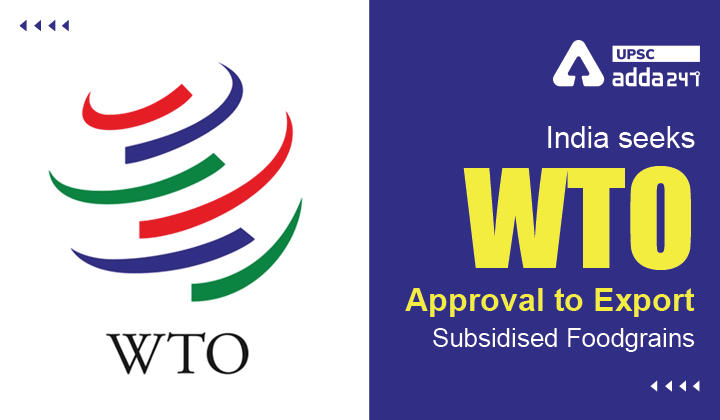Table of Contents
India WTO relations: Relevance
- GS 2: Bilateral, regional and global groupings and agreements involving India and/or affecting India’s interests.
India WTO UPSC: Context
- Recently, India has formally proposed at the World Trade Organization (WTO) to allow members to sell food grains from their public stockholdings to weather the ongoing food crisis that has led to sky-rocketing inflation.
India WTO agriculture: Key points
- The existing Agreement on Agriculture (AoA) prohibits member countries to export their public stockholding food grains to the world market because it could distort global food prices.
Agreement on Agriculture
- The WTO Agreement on Agriculture contains provisions in 3 broad areas of agriculture and trade policy: market access, domestic support and export subsidies.
Market Access
- This includes tariffication, tariff reduction and access opportunities.
- Tariffication: It means that all non-tariff barriers such as quotas, variable levies, minimum import prices, etc. need to be abolished and converted into an equivalent tariff.
- Ordinary tariffs including those resulting from their tariffication were to be reduced by an average of 36% with minimum rate of reduction of 15% for each tariff item over a 6-year period.
- Developing countries were required to reduce tariffs by 24% in 10 years.
- Special safeguard provision allows the imposition of additional duties when there are either import surges above a particular level or particularly low import prices as compared to 1986-88 levels.
Domestic Support
- For domestic support policies, measured by the Total Aggregate Measure of Support (total AMS), should be reduced by 20% in developed countries (13.3% in developing countries).
- Reduction commitments refer to total levels of support and not to individual commodities.
- De-minimum level: Policies which amount to domestic support at less than 5% of the value of production for developed countries and less than 10% for developing countries also excluded from any reduction commitments.
Export Subsidies
- The Agreement contains provisions regarding members commitment to reduce Export Subsidies.
- Developed countries are required to reduce their export subsidy expenditure by 36% and volume by 21% in 6 years, in equal installment (from 1986 –1990 levels).
- For developing countries, the percentage cuts are 24% and 14% respectively in equal annual installment over 10 years.
What is de minimus level in WTO?
- In WTO, minimal amounts of domestic support that are allowed even though they distort trade are set as:
- up to 5% of the value of production for developed countries,
- up to 10% of the value of production for developing countries.
What is peace clause?
- Developed and developing clashed over the issue of domestic support to farmers, even for domestic food security.
- In Bali Ministerial Conference 2013, a temporary peace clause was inserted which said that that no country would be legally barred from food security programmes even if the subsidy breached the limits specified in the WTO agreement on agriculture.
- This ‘peace clause’ was expected to be in force for four years until 2017, by which time the protagonists hoped to find a permanent solution to the problem.
- India worries because if the clause expires before a permanent solution is in place, food security programmes and policies to protect farmers, such as Minimum Support Prices, would siege to exist.
Read current affairs for UPSC





 TSPSC Group 1 Question Paper 2024, Downl...
TSPSC Group 1 Question Paper 2024, Downl...
 TSPSC Group 1 Answer key 2024 Out, Downl...
TSPSC Group 1 Answer key 2024 Out, Downl...
 UPSC Prelims 2024 Question Paper, Downlo...
UPSC Prelims 2024 Question Paper, Downlo...
